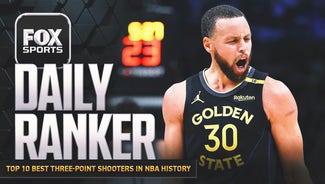
Warriors Rip Out The Cavs' Still-Beating Heart
CLEVELAND — Test the Warriors at your own peril. So many of the teams to stand in Golden State's way this postseason have been subject to cold obliteration—the sort of blowout that leaves those involved shell-shocked and numb. This was an undeniable dominance. Every loss stings, but those that are wholly explicable can sometimes sting less. "What happened, happened,” a resigned Quin Snyder said after his Jazz were swept by the Warriors in the second round. “We got blitzed."
“Those are the easiest to digest because you've been overplayed," Manu Ginobili said after the Spurs, too, were swept by Golden State. "The opponent was better than us, and in this case, way better than us." This is who the Warriors have been for months: a team so far ahead of its peers that it almost softens the blow. Even hardened competitors could swallow losing to a team this stacked.

In the absence of any real weakness, a hope lingered around the league that the ease of Golden State's run might eventually catch up to them. This version of the Warriors had played so well as to largely avoid pressure situations. To really push them in a playoff game would test their mettle, introducing another variable into a delicate superstar balance that might complicate the workings of a juggernaut.
It turns out that idea, too, was folly. Cleveland led Golden State 113–107 with three minutes remaining in Game 3. There would be no sobering loss. When the Warriors stormed back with 11 straight points, they ripped out the Cavs' still-beating heart. “It's definitely tough,” Kyrie Irving said. “It hurts.” There would be no tug of ball dominance between Kevin Durant and Stephen Curry, nor any trouble keeping Klay Thompson engaged, nor some issue with Draymond Green staying level. Golden State took what had been an impassioned Cavs effort fueled by an all-in home crowd and snuffed it out in the most ruthless fashion possible.
“Having a close game down the stretch… honestly, it's been awhile,” Curry said.
Whatever it is that theorists had hoped the Warriors would be in that pressure cooker moment, they were not. Durant and Curry, in particular, have come to collaborate in a way that lives outside any known superstar narrative. It was Durant who made Game 3's most deflating shot—a pull-up three in transition over a weary LeBron James—but it was Curry who got them there. Golden State's slight point guard has long been a master of subtlety, the source of such a foundational impact that voters for Finals MVP seemed to have looked right past it when the Warriors were on this stage two years ago.
His powers have only grown since. The haymakers Curry throws beyond the arc are largely his game's punctuation. What makes his game so special, particularly alongside another high-usage star in Durant, is how much he accomplishes just by being around and moving within the offense. A defense's preoccupation is its sincerest form of flattery and Cleveland's defenders are preoccupied with Curry constantly. Wherever he goes, a defender or two follow. Curry knows just how to string out this influence to buy teammates time all over the floor.

When we think of Curry, we're naturally drawn to the things he does differently than anything else: the quickness of his release, the depths of his range. From those qualities come the DNA of a plus-minus monster. If it's not the shot-making that's driving defenders crazy, it's the mere thought of it. When it's not his gravity that's breaking opponents, it's the way he grabs a defensive rebound and relentlessly pushes the pace. There's always something more to what Curry is doing on the floor than what is above board in the box score, and in Game 3 that dovetailed perfectly with the hammer that Durant brought down to crush whatever hope Cleveland had left. “The moment,” Curry said, “never overwhelms any of us. Especially not [Durant].”
Durant has meant many things to the Warriors on many different nights. In some ways, his presence is entirely superfluous—the free agent franchise player added to a 73-win near-champion that already had one. Yet he's also the one player in the league who, when the situation calls for it, can interchangeably slide in for either Curry or Green, the Warriors' two most critical players. In Game 3, he was called upon to stem the tide by playing center through Green's foul trouble. It was then through Durant that the Warriors attacked some of their favorite mismatches, including pitting him against the shorter, slower Tristan Thompson for one of the game's most crucial baskets.

All of this works so smoothly because Golden State's coaches and players made an effort all season to incorporate Durant into what they do as much as possible. They'll create some pretty basic iso-post opportunities for Durant to go get a bucket when needed. Yet largely, they've folded a seven-footer with handles and amazing touch into the natural rhythms of their offense. Durant fits because so many around him have gone out of their way—Curry, more than most—to ensure its success. It's less a matter of deference in the traditional sense than it is commitment to an existing identity.
Durant is the sort of talent that can eclipse some the workings around him. The calm with which he scores can make it tempting to get him the ball through the simplest means possible. The Warriors let Durant go when he sees an opening, but otherwise they are persistent in running their stuff. Within that stuff, Durant and Curry (and Thompson and Green) operate in a way that is overwhelming.
“It's probably the most firepower I've played in my career,” James said. “I played against some great teams, but I don't think no team has had this type of firepower.”

So much firepower, perhaps, that it obscured all the ways the Warriors were tested all along. This kind of intense late-game scenario has been a rarity for Golden State this postseason. But it's not as if the Warriors hadn't taken shots, endured runs, and faced down rallying teams. “I mean, I think we've been punched in the playoffs,” Green said. “Game 3 in Portland they punched us. We continued to fight. Game 3 in Utah they punched us. Game 1 in San Antonio they punched us. We continued to fight. And tonight, they punched us but we continued to fight.
"Everyone's just looking at I think we've won 10 games by 20 points or whatever it is, they haven't been challenged. But then you look at those games where we didn't win by 20 points and you're like, they have been challenged and they continue to fight.” Even some of those wins by 20+, frankly, represent nights where the Warriors were challenged and simply ran their opponents over.
It was fitting that the Cavs began their agonizing night with a montage set to the pulsing intensity of ’O Fortuna'—music concerning man's eternal wrestle with fate. James gave Cleveland exactly what it needed in his 46 minutes, playing his team to a seven-point advantage in his minutes on the floor behind a 39-point, nine-assists, 11-rebound effort. Irving was amazing in his defiance; such a variety of defender stepped into his path, and none could stop him from coaxing his way inside or floating in his shots off the glass. Then came fate, delivered cruelly by the hand of the one Warrior there is absolutely no answer for. The effective end of the series was, to quote Irving, a shot “that only Kevin Durant can hit.”


